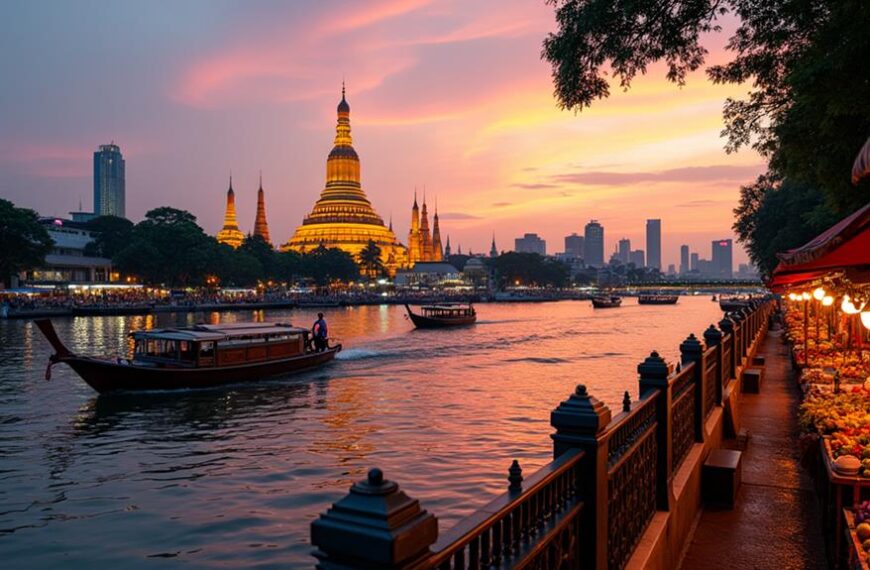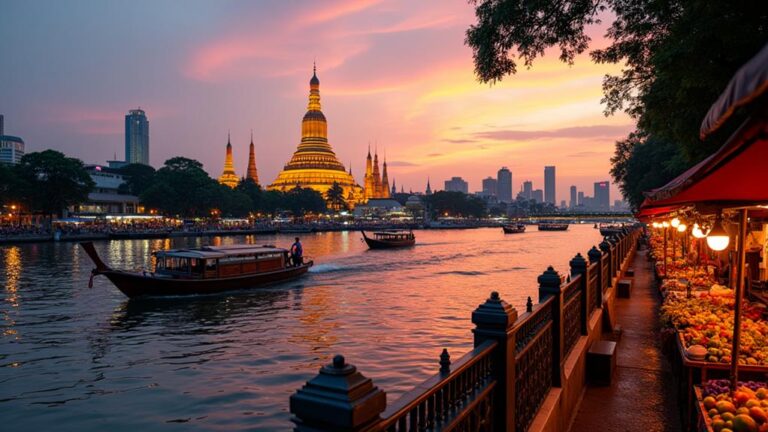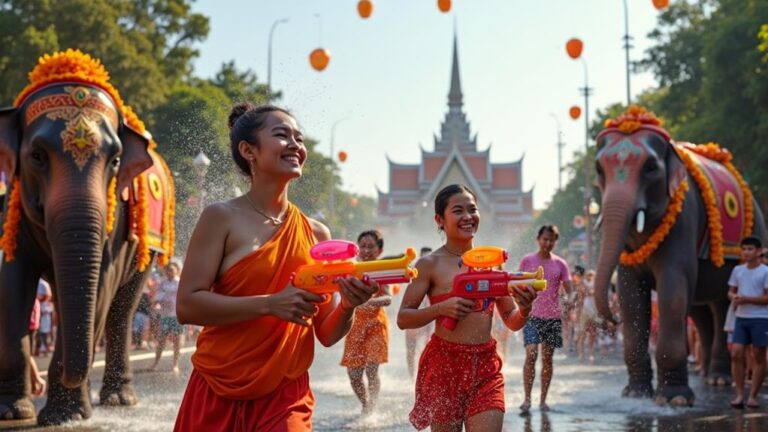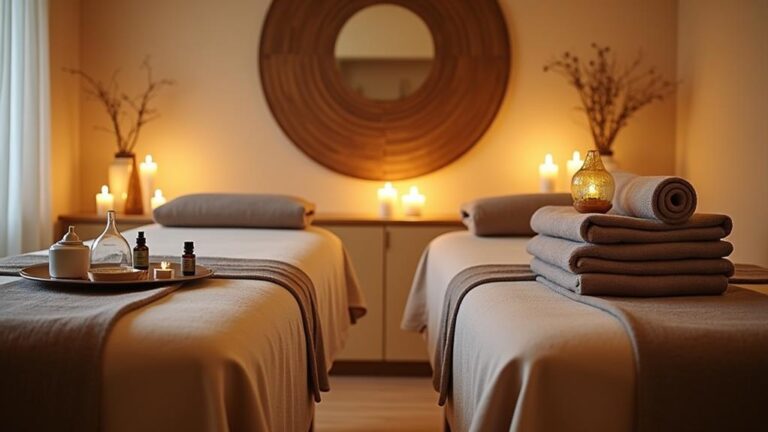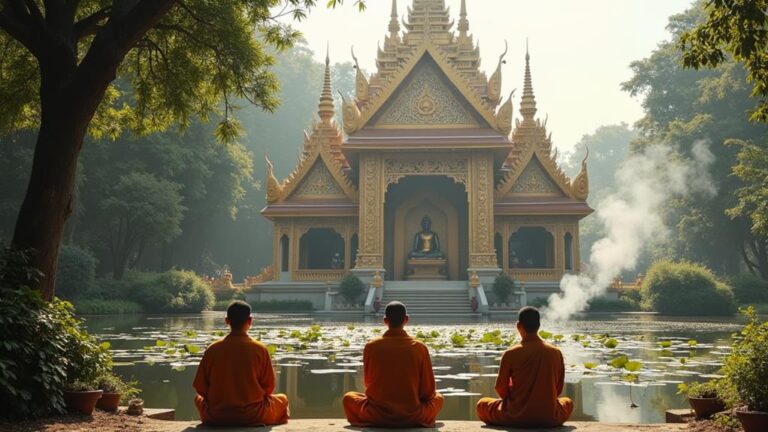When you become a monk in Thailand, you'll undergo a significant life transformation. You'll participate in a traditional ordination ceremony, embracing ancient Buddhist practices. Your daily routine will revolve around meditation, prayer, and community service, starting before dawn. You'll adhere to over 200 strict rules, including abstaining from eating after noon and refraining from worldly pleasures. This journey offers profound spiritual growth and self-reflection, whether you choose a temporary or permanent path. You'll face challenges in adapting to monastic life, especially as a foreigner. While women can't become fully ordained monks in Thailand, alternative spiritual roles exist. This spiritual journey can deeply impact your personal relationships and worldview.
Table of Contents
Key Takeaways
- You undergo an ordination ceremony involving rituals, prayers, and a test of dedication.
- Daily life follows a strict schedule starting before 3 am, focusing on meditation and alms rounds.
- You must adhere to over 200 rules, including abstaining from eating after noon and using electronic devices.
- The experience offers profound spiritual growth through immersion in Buddhist practices and teachings.
- You can choose temporary ordination for a brief experience or commit to permanent monkhood.
The Ordination Process
Becoming a monk in Thailand involves a deeply symbolic and culturally significant ordination process. This rite of passage combines ancient traditions with Buddhist practices, creating a meaningful experience for the individual and their community.
The journey begins with a special morning feast for the prospective monk, followed by the ordination procession. Family members play an essential role in the ceremony, participating in a ritualistic hair-cutting ceremony. They carefully cut the individual's hair before the monks complete the process by shaving the head and eyebrows. This act symbolizes the renunciation of worldly attachments.
The hair collected during this ritual holds spiritual significance. It's often placed in a lotus leaf or released into a river, representing purification and good fortune.
Throughout the ordination ceremony, you'll encounter prayers and chanting, creating a solemn atmosphere.
The final steps of the ordination process involve a test of your dedication and knowledge. You'll need to answer questions and read Buddhist scriptures to demonstrate your commitment. Upon successful completion, you'll receive your robes and alms bowl, marking your official entry into monkhood.
Daily Life as a Monk
As a monk in Thailand, you'll adhere to a strict daily schedule that typically begins before 3 am. Your days will be filled with structured activities, including meditation sessions, chanting rituals, and alms rounds. These practices are designed to cultivate mindfulness and discipline, core elements of monastic life that you'll continuously develop throughout your journey.
Strict Daily Schedule
Adhering to a strict daily schedule, Thai monks embrace a life of discipline and spiritual devotion. Your day as a monk in Thailand begins well before dawn, typically rising before 3 am. This early start sets the tone for a rigorously structured monastic life that emphasizes self-discipline and spiritual growth.
Your daily schedule revolves around prayer, meditation, and community activities. You'll follow a precise routine that leaves little room for idleness or distraction. Here's a glimpse into your typical day:
| Time | Activity | Purpose |
|---|---|---|
| 3:00 AM | Wake up | Start the day |
| 3:30 AM | Morning chanting | Spiritual practice |
| 5:00 AM | Alms round | Collect food donations |
Throughout the day, you'll engage in various tasks and rituals, always mindful of your appearance and conduct. You'll avoid wearing black during ceremonies, as it's believed to bring bad luck and shows disrespect. Your sustenance comes from the generosity of guests and supporters, reinforcing the interconnectedness between monks and the wider community. This structured lifestyle fosters an environment conducive to spiritual growth and self-reflection.
Meditation and Mindfulness Practices
Meditation and mindfulness practices form the spiritual core of a Thai monk's daily life. As a monk, you'll begin your day before dawn with meditation sessions, setting the tone for a day of introspection and spiritual growth. Throughout your journey, you'll engage in various forms of meditation to cultivate inner peace and self-awareness.
Your daily routine will include:
- Sitting meditation for extended periods
- Walking meditation to practice mindfulness in motion
- Chanting sessions to focus the mind and connect with Buddhist teachings
- Mindful eating practices during meals
These practices are designed to help you develop a deeper understanding of yourself and the world around you. You'll learn to observe your thoughts and emotions without judgment, fostering a sense of equanimity and compassion.
As you progress in your monastic life, meditation and mindfulness will become integral tools in your pursuit of enlightenment. These practices will help you navigate the challenges of daily life with grace and clarity, allowing you to better serve your community and embody the teachings of Buddhism.
Through consistent practice, you'll cultivate a profound sense of inner peace and wisdom that extends beyond the monastery walls.
Rules and Restrictions
The life of a Thai Buddhist monk is governed by a strict set of rules and restrictions that shape every aspect of their daily existence. When becoming a monk, you'll be expected to adhere to over 200 rules of conduct that guide your behavior, appearance, and interactions.
You'll wear traditional robes and abstain from eating after noon, handling money, and using electronic devices. These restrictions emphasize discipline and detachment from worldly distractions.
As a monk, you'll be prohibited from sleeping in high beds, drinking alcohol, and engaging in romantic or sexual relationships. You must also refrain from touching women, highlighting the importance of celibacy in monastic life.
Your daily routine will include alms rounds, attending religious ceremonies, and caring for elderly monks within the monastery.
The rigorous nature of these rules leaves little room for exceptions, ensuring that you maintain the sanctity and discipline of monastic life in accordance with Buddhist principles. By following these restrictions, you'll cultivate mindfulness and focus on spiritual growth, free from the distractions of modern life.
Spiritual Growth and Reflection
While the strict rules and restrictions of monastic life may seem overwhelming, they serve as a foundation for profound spiritual growth and reflection. As you commence on your journey as a monk in Thailand, you'll discover that ordination as a monk offers a unique opportunity for personal development and spiritual awakening.
During your time in the monastery, you'll immerse yourself in Buddhist practices and teachings, allowing for deep contemplation and inner transformation. Thai culture places great importance on this spiritual journey, viewing it as a rite of passage for many young men.
Your daily routine will revolve around activities designed to foster spiritual growth:
- Meditation sessions to cultivate mindfulness and self-awareness
- Prayer and chanting to connect with higher consciousness
- Studying Buddhist scriptures to gain wisdom and insight
- Participating in communal rituals to strengthen your sense of purpose
Through these practices, you'll explore your inner self and develop a stronger connection to the divine. The structured environment of monastic life provides the ideal setting for this profound journey of self-discovery and spiritual enlightenment. As you progress, you'll find yourself evolving in ways you never imagined possible.
Temporary Vs. Permanent Monkhood

Two paths await those considering monkhood in Thailand: temporary and permanent ordination. Temporary ordinations offer a unique opportunity to experience monastic life without a lifelong commitment. This option allows you to immerse yourself in Buddhist traditions for a brief period, ranging from a few days to several months. You'll gain valuable insights into the spiritual practices and cultural aspects of Thai Buddhism without the pressure of a permanent vow.
On the other hand, permanent monkhood requires a profound dedication to the Buddhist way of life. If you choose this path, you'll commit to a lifetime of strict rules and practices, embracing the monastic lifestyle as your spiritual calling. Permanent monks in Thailand typically ordain for life, devoting themselves entirely to their religious duties and personal enlightenment.
Both temporary and permanent monkhood experiences provide distinctive perspectives on Thai Buddhist culture. While temporary ordinations offer flexibility and a taste of monastic life, permanent monkhood demands unwavering commitment. Your choice between these two paths will depend on your personal goals, spiritual aspirations, and readiness to embrace the Buddhist way of life.
Cultural Significance in Thailand
As you explore Thai culture, you'll find that becoming a monk holds significant cultural importance.
It's often viewed as a rite of passage for young men, marking their shift into adulthood and spiritual maturity.
This practice also serves as a merit-making tradition, where families gain spiritual benefits by supporting their sons or male relatives through the ordination process.
Rite of Passage
Traditional practices are deeply rooted in Thailand, and entering the monkhood stands as a pivotal rite of passage for young Thai men. This deeply ingrained practice symbolizes your dedication to the Buddhist faith and marks a significant change in your life. As you set off on this journey, you'll discover that it's not just a personal experience, but one that involves your entire family and community.
The ordination ceremony is a significant occasion where family members play essential roles. They'll engage in rituals such as:
- Trimming your hair
- Presenting you with robes
- Supporting you through the change
- Celebrating your spiritual commitment
As you transition into monkhood, you're embracing a more disciplined and spiritually focused existence within the Thai Buddhist community. This rite of passage carries immense cultural and social significance, reflecting the reverence for tradition and spiritual values that saturate Thai society.
You'll find that entering the monkhood isn't just about personal growth; it's a reflection of your cultural legacy and a way to honor your family and community. This experience will unquestionably shape your perspective and leave a lasting impact on your life.
Merit-Making Tradition
Within the heart of Thai culture lies the deeply entrenched tradition of merit-making through monkhood. This practice, rooted in Buddhist beliefs, is a cornerstone of spiritual life in Thailand. When you enter into monkhood, you're not just starting on a personal journey; you're participating in a revered cultural institution.
In Thai society, the act of entering monkhood is viewed as a noble and selfless pursuit. It's believed to accumulate merit, earning spiritual rewards for both the individual and their family.
Many young Thai men choose to join monkhood, even if only for a short period, to fulfill this important cultural expectation.
Challenges for Foreign Monks

Foreign monks starting their spiritual expedition in Thailand face a unique set of challenges. As you commence on this path, you'll come across obstacles that test your dedication to monastic life. Language barriers can hinder your understanding of rules and routines, making it challenging to fully engage in daily activities. Cultural differences and unfamiliar customs may also require significant adjustment.
Adapting to the Thai environment presents physical and mental demands:
- Acclimating to the tropical climate
- Adjusting to local cuisine and eating habits
- Maneuvering through unfamiliar living conditions
- Dealing with limited access to familiar support systems
Integration into the Thai monastic community takes time and effort. You'll need to build relationships and earn trust from local monks and supporters. This process can be slow and may lead to feelings of isolation, especially when you're far from family and friends.
As a foreign monk, you'll need to develop patience and resilience to overcome these challenges. While the journey may be difficult, many find that persevering through these obstacles deepens their spiritual growth and understanding of Buddhist teachings within the Thai monastic tradition.
Women's Roles in Buddhism
While you'll find that women in Thailand can't become fully ordained monks, they can serve as nuns called maechi, though with a more limited monastic status.
You'll discover that many women pursue alternative spiritual paths within Buddhism, supporting temple activities and practicing devotion in various ways.
Despite these restrictions, you'll observe ongoing advocacy for ordination equality, with some groups challenging traditional norms by ordaining women as monks, albeit without widespread acceptance from central Buddhist authorities.
Nuns' Limited Monastic Status
Thailand's Buddhist tradition maintains a strict gender divide when it comes to monastic roles. As a woman seeking spiritual fulfillment within Thai Buddhism, you'll find your options are more limited compared to men. While you can't become a fully ordained monk, you may choose to become a nun, known as a maechi.
As a maechi, you'll experience a different level of engagement with Buddhist practice:
- You'll follow less strict rules than monks
- You won't take the same vows as monks
- You'll have limited monastic status in Thai Buddhist culture
- You'll face challenges in gaining equal recognition and support
Your role as a nun will be notably different from that of monks. You'll have fewer responsibilities and privileges within the temple hierarchy, and your spiritual journey may not be viewed with the same reverence as that of male monastics.
Despite these limitations, many women find meaningful ways to participate in Buddhist life through alternative roles. Some renegade groups have attempted to challenge the status quo by ordaining women as monks, but these efforts face strong opposition from central religious authorities.
The debate surrounding women's roles in Thai Buddhism continues to evolve, reflecting broader social and cultural discussions about gender equality.
Alternative Spiritual Paths
Despite the limitations on women's monastic roles in Thai Buddhism, several alternative spiritual paths have emerged for those seeking deeper engagement with their faith. While men in Thailand can shave their heads and become fully ordained monks, women have found other ways to pursue spiritual growth within the Buddhist tradition.
One significant path is becoming a maechi, or nun. As a maechi, you'll follow a less stringent set of rules compared to monks but still play an important role in supporting the monastic community. You'll contribute to the preservation and practice of Buddhism, although you won't take the same vows as monks.
The evolving landscape of women's roles in Thai Buddhism has led to efforts to expand opportunities for female practitioners. Some renegade groups have even attempted to ordain women as monks, though these actions have been rejected by central Thai Buddhist leaders.
As you explore alternative spiritual paths, you'll find that the role of women in monastic life is gradually changing, with ongoing discussions about how to create more inclusive practices while respecting traditional structures.
Advocacy for Ordination Equality
Over the past few decades, advocacy for ordination equality has gained momentum in Thai Buddhism. As you investigate this issue, you'll discover that women in Thailand can't be ordained as monks but can serve as nuns called maechi. This disparity has led to growing debates about gender equality in traditional Thai Buddhism.
The push for ordination equality has faced significant challenges:
- Central Thai Buddhist leaders reject the ordination of women as monks
- Women in nun roles have different vows and responsibilities compared to male monks
- The issue remains contentious within Thai Buddhist communities
- Some groups have taken controversial steps to ordain women outside Thailand
A notable example of this controversy occurred when a renegade Thai Buddhist group in Australia ordained a woman as a monk. This action sparked debate and was met with opposition from traditional Buddhist leaders in Thailand.
As you explore deeper into this topic, you'll find that the role of women in Thai Buddhism is complex and evolving. While maechi continue to play an important spiritual role, advocates for ordination equality argue that full monkhood should be open to women, challenging centuries-old traditions and interpretations of Buddhist texts.
Monastic Education and Training

Monastic learning serves as the foundation of a monk's life in Thailand. As you commence on this spiritual journey, you'll immerse yourself in a rigorous curriculum that covers Buddhist scriptures, meditation techniques, and monastic rules. You'll also explore the Pali language, essential for chanting and understanding sacred texts.
Your daily routine will be led by senior monks who'll guide you on rituals, meditation practices, and proper conduct. The education you'll receive highlights discipline, mindfulness, and ethical behavior in line with Buddhist teachings. Throughout your training, you'll nurture crucial virtues like compassion, patience, and selflessness.
| Aspect of Monastic Learning | Focus Areas |
|---|---|
| Scriptural Studies | Buddhist texts, Pali language |
| Meditation | Techniques, mindfulness |
| Ethical Conduct | Discipline, monastic rules |
| Spiritual Development | Compassion, selflessness |
This in-depth monastic education aims to change you spiritually and intellectually. You'll acquire a profound understanding of Buddhist philosophy while honing practical skills for leading a monastic life. The knowledge and experiences you gain during this period will mold your perspective and influence your actions as a monk in Thai society.
Impact on Personal Relationships
In light of the spiritual journey you're embarking on, it's essential to understand how becoming a monk in Thailand can impact your personal relationships. Your decision to pursue a monastic life often leads to significant changes in family dynamics and communication patterns with loved ones.
As you set off on your spiritual voyage, you'll likely experience:
- Limited contact with family and friends
- Misunderstandings due to reduced communication
- Emotional distance from worldly affairs
- Challenges in maintaining regular interactions
Your family members may struggle to adjust to the new dynamic, finding it difficult to accept your limited involvement in personal matters. The celibate lifestyle and focus on spiritual growth can create a sense of detachment from everyday concerns, potentially straining existing relationships.
It's important to recognize that prioritizing your spiritual journey may lead to shifts in your personal connections. While you're dedicating yourself to monastic life, your loved ones might grapple with the changes in your availability and engagement.
This transformation can be challenging for all parties involved, requiring patience and understanding as everyone adapts to the new circumstances surrounding your role as a monk in Thailand.

